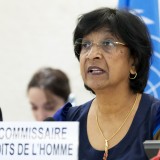 UN Photo/Jean-Marc Ferré
UN Photo/Jean-Marc Ferré
At the commencement of the 22nd Session of the Human Rights Council on 25th February, the United Nations High Commissioner for Human Rights, Navi Pillay, acknowledged the 20th-year anniversary of the Vienna Declaration and Plan of Action and described the VDPA as
“the most significant overarching human rights document produced in the last quarter of a century….. breaching a second wall that had divided States over the previous decades…. (and) crystallizing the underlying principles that human rights are universal, indivisible, interdependent and interrelated.”
Pillay went on to identify the tangible outcomes that arose from Vienna, including;
- The promotion of women’s rights through the Convention on the Elimination of All Forms of Discrimination against Women, the integration of women’s rights and involvement into all UN activities, the Declaration on the Elimination of Violence against Women, and the creation of the Special Rapporteur on Violence against Women.
- The creation of the Office of the High Commission on Human Rights, to oversee and streamline the UN system.
- The drawing of focus to impunity, and the need for international disciplining structures to hold perpetrators of human rights violations to accountability. This subsequently developed into the establishment of the International Criminal Court in 2002, the world’s first permanent international crime tribunal.
- Giving a voice and space for civil society and national human rights institutions as key independent and authoritative protectors and promoters of human rights.
- The increase in treaty bodies since Vienna, including international treaties on Persons with Disabilities and Persons of Disappearance. Also the increase in State parties and ratifications to treaties, which have increased three-fold.
- The creation of 48 mandates created with 72 appointed, independent, experts.
Despite this progress over the past 20 years, Pillay soberly noted the great and many challenges yet to be faced and the reality that “the promise of respecting all human rights for all people is still a dream for too many.” Particular concern was given to the continued discrimination and subjection to violence of women, the suppression and bullying of civil societies and human right defenders across the world, and the limitations to the ICC powers and ability to ensure global justice. Pillay thus called for the 22nd Session of the Council to address and advance these concerns along with many others.
In a final inspirational assertion, Pillay advanced her hopes for the 22nd session; “Our task… is to extend these (VDAP) benefits to every last person on earth…For while the past twenty years have seen extraordinary progress, we should never forget that there have been those who have been left behind – migrants, older persons, religious and ethnic minorities, people persecuted because of their sexual orientation and gender identity, to name just a few. Our work here will not be done until the promise of the Vienna Declaration is made real for everyone – no exceptions, no excuses.”